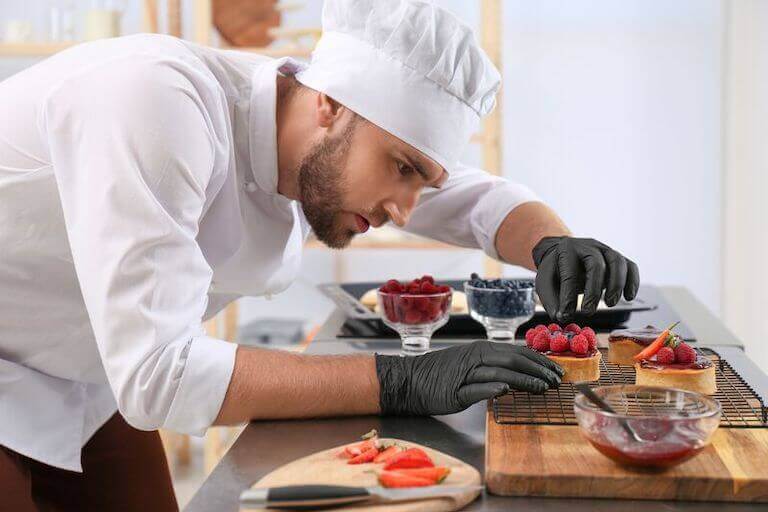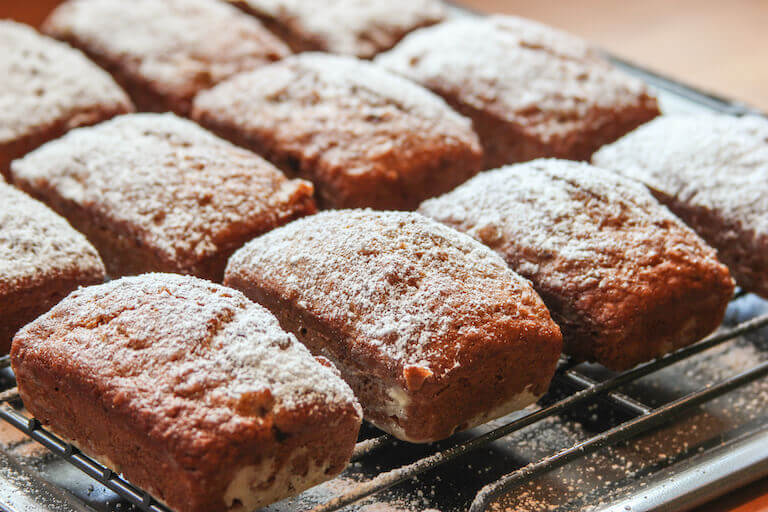Listen to This Article:
The terms “baking” and “pastry” often get lumped together, which is understandable—baked goods and pastries are each usually oven-baked and often involve dough, which would seem to place them in the same corner of the culinary world.
However, the jobs of baker and pastry chef differ significantly. A baker is more of a generalist who bakes a wide variety of sweet and savory items including bread, rolls, pies, cakes, and more, while a pastry chef specializes in desserts and might also make non-baked goods like custards, sauces, and chocolates. They can have different levels of experience as well. “Baker” can be an entry-level position, but “pastry chef” is a title that comes with more experience and is often a managerial role.
Keep reading to find out more about the difference between a pastry chef and a baker, and explore which career path might be right for you!
What Does a Pastry Chef Do?
Any culinary role that contains the word “chef” is typically an advanced one. Chefs are supervisors and leaders in the kitchen, and the pastry chef is no exception. Pastry chefs create dessert menus and recipes in restaurants, pastry shops, and patisseries. They may be in charge of or own a bakery or pastry shop, or they might work in a specialty shop.
Although they may work under the supervision of an executive chef, the pastry chef is generally in charge of their own department. They may work independently or they may supervise a small team of pastry cooks.
Pastry Chef in French
A dessert chef is often called a pastry chef or a patissier. The term for “pastry chef” in French is “pâtissier” (for a male) or “pâtissière” (for a female). It’s derived from the word “pâtisserie,” which means “pastry.”

Pastry chef is a specialized role that often involves detailed work and managerial responsibilities.
In a restaurant, pastry chefs often do very detailed work, plating and decorating their creations with intricate piping or dots of sweet sauces. They’re also responsible for the non-baked elements of a dessert. If the dessert menu includes homemade sorbet, for example, the pastry chef will probably make it. Unlike a baker, a pastry chef usually won’t make bread or other savory baked goods.
What Does a Baker Do?
“Baker” is a more general job title than pastry chef, and a baker’s duties can include making a wide variety of baked goods. Some bakers do a little bit of everything, while others choose to focus on a specific niche. But overall, bakers may make both sweet and savory baked goods, from bread, cakes, and cookies to ham and cheese croissants or focaccia. Unlike pastry chefs, they usually won’t have to be experts in chocolate, sugar sculptures, ice cream, and other sweets.
A baker is usually not a manager, and they typically follow recipes rather than create their own. But that doesn’t mean they don’t need education and training. Bakers must understand the science behind their baked goods, and they need to know how to work commercial baking equipment. They may also have to scale recipes up or down, so they’ll need to know their baking math.

A baker’s responsibility often includes making large amounts of baked goods.
Bakers may also do less decorative work than pastry chefs. Pastry chefs can make complex plated desserts, while bakers spend their days making a high volume of simpler baked goods. They may do some cake decorating, like adding some basic piping, but any intricate decorating is usually reserved for cake decorating or design specialists.
What About the Green Dough? Pastry Chef and Baker Salaries
Because pastry chefs have more responsibility, they often earn higher salaries than bakers. According to Salary.com, the average annual salary for a pastry chef in the U.S. is $68,642, while the average baker salary in the U.S. is $35,021.
Actual salaries can vary dramatically based on the baker’s or pastry chef’s education and experience, type of foodservice establishment, and city where they work.
Certifications in Baking and Pastry
Pastry and baking are both scientific disciplines, so formal training can be very helpful in nailing down the basics and advancing to more technical and difficult recipes. Anyone hoping to follow either path should consider getting a degree or diploma in baking and pastry or taking professional baking classes. Education is one of the best ways to build a solid foundation in baking science and to explore the different kinds of doughs and pastries.
Beyond a degree or diploma, several reputable culinary industry groups offer additional education and certification. The American Culinary Federation recognizes Certified Master Pastry Chefs™, Certified Executive Pastry Chefs™, and Certified Pastry Culinarians™.
The Retail Bakers of America offers baking-focused certifications for Journey Bakers, Certified Bakers, and Certified Master Bakers. Colette Christian, Escoffier Pastry Chef Instructor, is a Certified Master Baker through the RBA and an ACF Certified Executive Pastry Chef™. She had to bake dozens of perfect pastries over two days to earn the RBA title.
If the Jobs Are Different, Why Are Baking and Pastry Taught Together?
Although the day-to-day jobs are different, there’s enough overlap in skills that it makes sense to teach future bakers and pastry chefs together in pastry school. Both professionals need to know the principles of baking and the science behind why a recipe works. They need to understand different baking techniques and how to work at scale, making larger or smaller batches of product based on the needs of the business, and they both need some decorating skills.
Equipped with these same building blocks, students on both paths can go on to learn more in the workplace and grow into their future careers.
Where Will Baking Take You?
What if you know you want to bake, but don’t know if you’d rather build a career in a busy bakery or a fine dining pastry department? That’s okay! The first step on both paths is to get that foundational education.
Contact our Admissions Department to find out more about how studying at Escoffier can help you discover where your passions lie within the world of baking and pastry arts.
TO EXPLORE MORE CAREER OPPORTUNITIES IN BAKING AND PASTRY, TRY THESE ARTICLES NEXT:
- What Are the Career Opportunities in Baking and Pastry?
- What Is It Like to Be a Pastry Chef?
- How to Start a Bakery Business From Home
*Information may not reflect every student’s experience. Results and outcomes may be based on several factors, such as geographical region or previous experience.
This article was originally published on January 27, 2022, and has since been updated.


